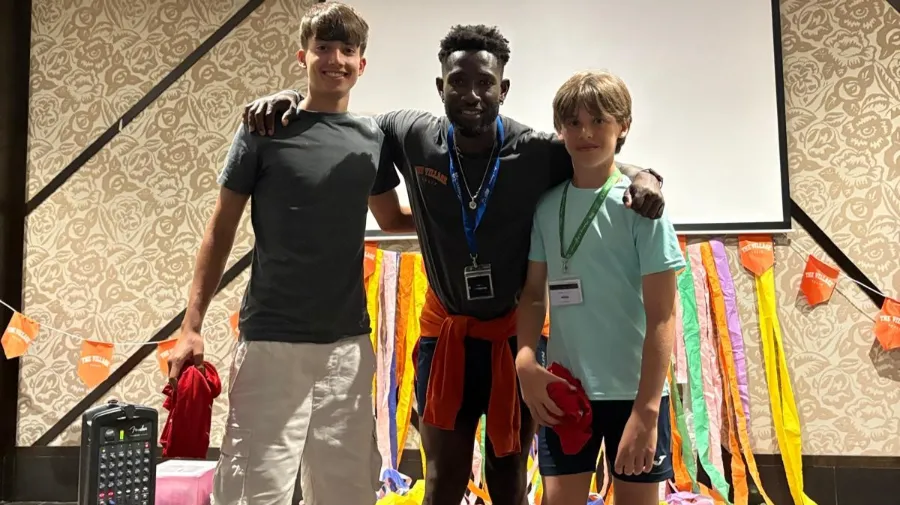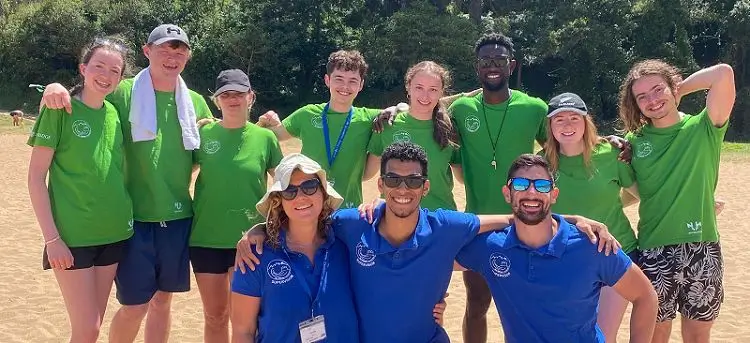Leaving your child at an English camp is an exciting decision, but it also raises questions. As a parent, it’s normal to wonder whether they will be well cared for, whether the facilities are adequate, or whether it is truly a safe English camp. The good news is that there are objective indicators that allow you to know in advance whether a camp offers real guarantees of safety and wellbeing. Understanding them not only brings peace of mind to families, but also ensures that children enjoy the experience and make the most of their English learning.
Factors that make an English camp safe
When parents think about the safety of an English camp, they usually imagine emergency protocols or attentive team leaders. However, safety goes far beyond that. A safe English camp is one that combines three dimensions: physical protection, emotional wellbeing, and trust in the learning process.
This balance is especially important in an international English immersion summer camp in Spain, where children live, learn and interact in English throughout the day in a carefully supervised environment.
Physical protection is reflected in well-maintained facilities, activities designed with preventive measures, and a trained staff ready to react in case of any incident. But safety also means emotional wellbeing. Children should feel accompanied, understood, and part of a group, avoiding risks of isolation or social conflicts. Finally, trust in learning is another key pillar: knowing that your child is in an environment that encourages natural English immersion, with qualified coaches who create a positive and stimulating atmosphere.
A camp that integrates these three aspects brings peace of mind to families and creates a space where children can enjoy, learn, and grow with full confidence. That is the true difference between any camp and a genuinely safe English camp.
What to check in the camp’s staff
The heart of any English camp is its team leaders. They are with the children day and night, facilitate group dynamics, and must act quickly in the event of any unforeseen situation. That’s why, before choosing a camp, it’s important to ensure that the staff offers solid guarantees of training, experience, and attention.
Ideal staff-to-child ratio
A key factor is the ratio between staff and participants. In a safe camp, the ideal proportion is one coach for every 8 to 10 children during general activities, with even closer supervision during water sports or excursions. A balanced ratio ensures that each child receives the attention they need and doesn’t go unnoticed within the group.
Training in first aid and emergency management
Beyond enthusiasm or charisma, coaches must be prepared to act in critical situations. Training in first aid, evacuation protocols, and crisis management is not optional — it is a requirement for any camp that wants to inspire real confidence in families.
Staff experience and certifications
Experience is another essential factor. Parents should ask about the team’s background, staff stability over the years, and the certifications they hold. A safe English camp is transparent on this point and has no problem sharing information about who its coaches are, how they are selected, and what ongoing training they receive.

Signs that facilities are safe
The facilities of a camp are one of the most visible elements for parents and at the same time a key factor in safety. A well-maintained environment adapted to children makes the difference between an improvised camp and a truly safe English camp.
Dormitories and bathrooms adapted for children
Rest areas must be clean, well-ventilated, and equipped with basic safety measures: beds in good condition, signposted access routes, and nighttime supervision. Bathrooms and showers must be sufficient for the number of participants, properly maintained, and adapted for younger children.
Kitchen and dining hall with allergy control
Food safety is critical. A safe dining hall must not only comply with hygiene regulations but also have clear protocols for managing allergies and intolerances. Asking about food traceability, kitchen staff training, and the availability of adapted menus is essential.
Supervised play areas and regular maintenance
Play and sports areas must have well-maintained equipment and constant supervision. Pools, courts, and playgrounds require regular inspections to prevent accidents. A responsible camp offers transparent information about these checks and restricts access to potentially risky areas.
Safe facilities not only offer physical protection but also inspire confidence in parents and reinforce the positive experience children have at camp.
Health and emergency protocols every camp should have
Safety at an English camp is not improvised. Behind every activity there should be a prevention and action plan designed to protect children in any situation. These protocols are the true guarantee of peace of mind for families.
Action plan in case of accident
A professional camp has clear procedures to respond immediately to incidents such as falls, bumps, or minor sports accidents. This includes fully equipped first-aid kits, trained staff, and quick access to a nearby medical center.
Allergy and medication control
Every year, the number of children with food allergies or specific medical needs increases. For this reason, it is essential that camps collect that information beforehand, track it daily, and assign responsible staff members to manage medication. A small oversight can become a serious risk if not handled properly.
Liability and medical insurance included
One factor many parents overlook is insurance coverage. A safe English camp must have liability insurance and a medical insurance policy that protects children during all activities, both on and off site. This detail sets apart professional organizations from those that simply trust nothing will go wrong.
Well-defined protocols not only prevent risks but also build trust with families and ensure that children enjoy the experience with maximum protection.

The importance of communication with parents
For many families, true peace of mind does not come only from good facilities or protocols, but from feeling informed at all times. Fluid communication between the camp and parents is an essential part of safety.
Usual communication channels
A safe English camp offers several communication methods: a 24-hour emergency phone, dedicated contact emails, and in many cases, mobile apps that allow even closer monitoring.
How incidents are communicated
Transparency is key. In the event of an accident, routine change, or health issue, parents must be informed immediately. The best camps follow clear procedures: first they attend to the child, and then they contact the family with a detailed explanation of what happened and the measures taken.
Photos and updates for parent peace of mind
Beyond emergencies, many camps offer daily updates with photos and messages so parents can see how their children are enjoying themselves. This simple detail reduces anxiety and builds trust, as it allows families to check that everything is going well without constant calls.
A camp that prioritizes communication shows that it understands parents’ concerns and cares both about safety and the emotional wellbeing of the whole family.
Key questions every parent should ask before booking
Choosing a safe English camp is not a matter of luck — it depends on asking the right questions before enrolling your child. With this checklist, any family can ensure the organization meets the minimum standards of safety and wellbeing:
- What official accreditations does the camp have?
- What is the staff-to-child ratio during activities?
- Does the staff have training in first aid and emergency management?
- How are food allergies and daily medication handled?
- What protocols exist to prevent and act against bullying?
- Does the camp include medical and liability insurance?
- What evacuation or action plans are in place for accidents or extreme weather?
- How are parents kept informed during the stay?
- What experience does the staff have and how long have they worked with the organization?
- How often are the facilities inspected and certified for safety?
Answering these questions clearly and transparently is the best way to distinguish a professional camp from one that does not offer real guarantees.
How to choose an English camp that brings peace of mind
Safety should not be an optional extra — it must be the foundation on which the entire camp experience is built. When a parent chooses a safe English camp, they are investing not only in language learning, but also in the reassurance of knowing their child is in good hands.
A professional camp does not settle for meeting legal minimums. It goes further, taking care of every detail: from selecting experienced international staff to continuously reviewing facilities, implementing clear medical protocols, and maintaining transparent communication with families. This combination ensures that children feel protected, happy, and open to learning.
In practice, choosing an English camp that offers peace of mind means checking that all the points discussed above are fulfilled. And when parents find a place where safety, human care, and English learning go hand in hand, they know they are making the best decision for their child’s summer.
At Camp the Village, we understand that safety is the foundation of any positive experience. That’s why every detail is designed to ensure that children learn English in a well-cared-for environment, with qualified staff, inspected facilities, and constant communication with families. We believe that when parents feel confident, children enjoy more, make friends, and embrace learning with enthusiasm.
If you’re looking for a safe English camp where your child can enjoy an unforgettable summer while improving their language skills, this is the place. Places are limited and allocated on a first-come, first-served basis, so we encourage you to secure yours as soon as possible.




